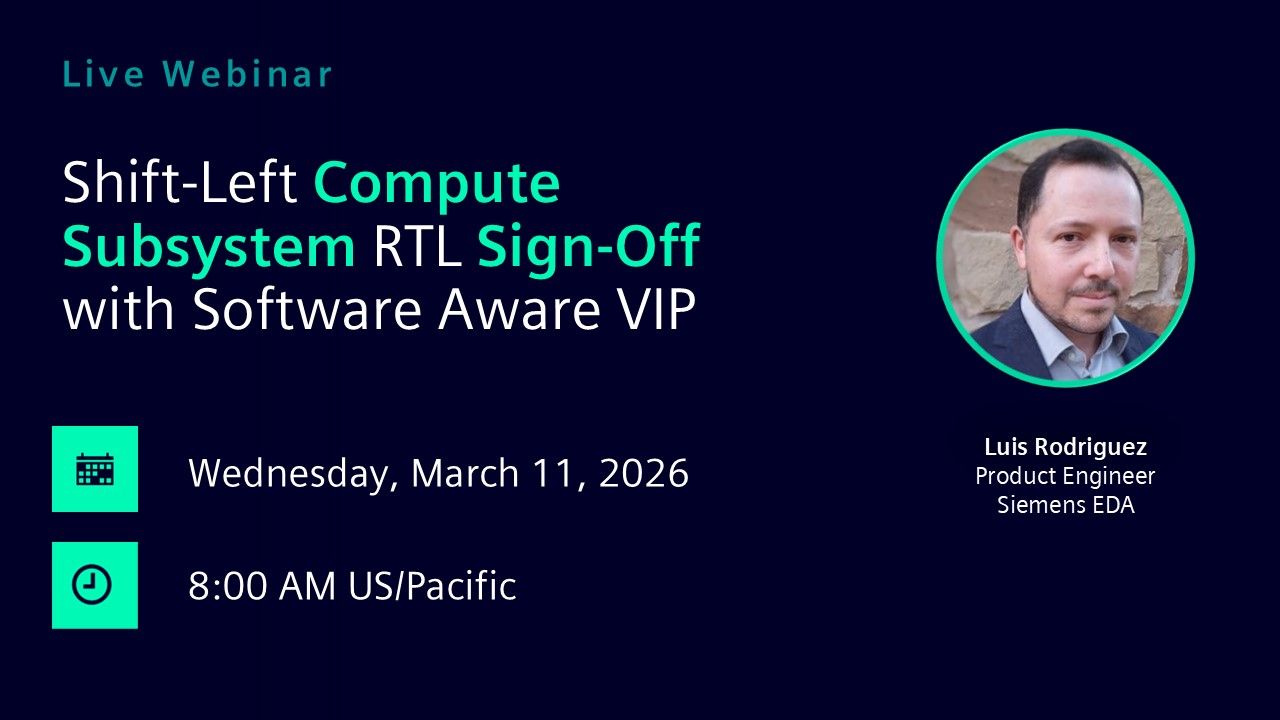Search Results
Filters
Advanced Search
2211 Results
-

Shift-Left Compute Subsystem RTL Sign-Off with Software Aware VIP
Webinar - Mar 11, 2026 by Luis Rodriguez
In this webinar we present a scalable methodology to accelerate the development and verification of Compute Subsystems such as Arm® Neoverse™ V3 Compute Subsystem (CSS)-based designs, with a shift-left in simulation and signoff using Avery Protocol VIP, CSS VIP, Software Aware VIP, Arm Fast Models and QEMU models.
-

Human-Centered Agentic AI Workflows for RTL Verification
Paper - Feb 27, 2026 by Harry Foster
The Questa One Agentic Toolkit extends the Questa One solution with human-centered agentic workflows that embed intelligence directly into these workflows, rather than isolated tools. By combining engine-native context, goal-driven agents, deliberate human-in-the-loop design, and open integration, the Questa One Agentic Toolkit provides a pragmatic path toward more adaptive and scalable productivity, supporting faster progress without sacrificing trust or rigor.
-
Human-Centered Agentic AI Workflows for RTL Verification
Resource (Paper (.PDF)) - Feb 27, 2026 by Harry Foster
In this paper, you will learn that productivity challenges in modern semiconductor development stem less from individual tool limitations and more from process-level complexity across design creation, verification, and iteration. Agentic EDA addresses this shift by embedding intelligence directly into workflows that span creation and validation.
-

AI Assisted FPU Verification Using Questa One SFV
Webinar - Feb 25, 2026 by Gerardo Nahum
One of the key components of the AI revolution is Floating Point Hardware design. Design targeting AI requires at times fast computing with low precision and at times very high precision in its calculations. In this webinar we show how Questa One AI assisted tools for Static Formal, help to generate full formal verification checkers for user defined functionality including floating-point operations.
-
AI Assisted FPU Verification Using Questa One SFV
Resource (Slides (.PDF)) - Feb 25, 2026 by Gerardo Nahum
In this webinar we show how Questa One AI assisted tools for Static Formal, helps to generate full formal verification checkers for user defined functionality including floating-point operations.
-
Siemens at DVCon U.S. 2026
Resource (Verification Horizons Blog) - Feb 22, 2026 by Dennis Brophy
DVCon U.S. returns to a larger venue at the Hyatt Regency Santa Clara. The expanded rooms and exhibit hall are intended to support a program heavily focused on AI in verification. Siemens EDA will have a significant presence throughout the week. This includes a sponsored luncheon panel, a major conference keynote, technical papers, and multiple tutorials that advance the state of verification, agentic AI, CDC and RDC standardization, and HLS to FPGA cloud prototyping.
-

Securing Next-Generation Interconnects: PCIe® Gen7 Security Verification
Webinar - Feb 18, 2026 by Jalaj Gupta
This session highlights what’s new in PCIe Gen7 security and demonstrates how Avery Verification IP-built on deep PCIe and UCIe verification expertise-enables early validation of TDISP and IDE functionality, comprehensive protocol and security coverage, and faster compliance, reducing risk and time-to-market for secure PCIe designs.
-
Securing Next-Generation Interconnects: PCIe® Gen7 Security Verification
Resource (Slides (.PDF)) - Feb 18, 2026 by Jalaj Gupta
PCIe® Gen7 delivers unprecedented bandwidth and introduces stronger security capabilities, including TDISP for device security and isolation, and IDE for end-to-end data encryption and integrity.
-
Beyond Simulation: Unlocking Absolute Certainty in Hardware Design with Formal Verification
Resource (Verification Horizons Blog) - Feb 16, 2026 by Nicolae Tusinschi
Have you ever wondered how we can truly guarantee that the complex chips powering our world – from smartphones to self-driving cars – will always work flawlessly, even in the most obscure scenarios? It’s a question that keeps many engineers up at night, especially as designs grow exponentially more intricate. That’s precisely the challenge addressed in my recent paper, Achieving Mathematical Certainty in Design Verification with Formal .
-
Don’t Miss CDC Bugs in Low Power Designs!: Formal Meets Power Aware CDC
Resource (Slides (.PDF)) - Feb 11, 2026 by Kurt Takara
In this webinar, you will learn how Questa CDC combines exhaustive formal analysis with automated protocol assertions to prove safe crossings and filter functionally false positives.
-

Don’t Miss CDC Bugs in Low Power Designs!: Formal Meets Power Aware CDC
Webinar - Feb 11, 2026 by Kurt Takara
This webinar will discuss how Questa CDC Power Aware analysis can address this problem, as well as describe how Questa CDC combines exhaustive formal analysis with automated protocol assertions to prove safe crossings and filter functionally false positives.
-

Close Coverage Faster with Questa One Sim's Unreachability Analysis
Webinar - Feb 05, 2026 by Justin Royse
Coverage closure remains the single largest challenge facing functional verification teams today, affecting 34% of both ASIC and FPGA design projects. As verification approaches completion, coverage scores plateau well short of project goals—a phenomenon commonly known as the "Last Mile problem." This webinar explores why traditional approaches to closing coverage gaps fall short and introduces automated unreachability analysis in Questa One Sim as a transformative solution.
-
Close Coverage Faster with Questa One Sim's Unreachability Analysis
Resource (Slides (.PDF)) - Feb 05, 2026 by Justin Royse
This webinar explores why traditional approaches to closing coverage gaps fall short and introduces automated unreachability analysis in Questa One Sim as a transformative solution.
-
Compute Subsystem RTL Signoff with CSS VIP and Software Aware VIP
Resource (Slides (.PDF)) - Feb 04, 2026 by Luis Rodriguez
This session highlights a robust methodology to accelerate the development and verification of Compute Subsystems such as Arm® Neoverse™ V3 based and also RISC-V based Compute Subsystem (CSS)-based designs, with a shift-left in simulation and signoff using Avery Protocol VIP, CSS VIP, Software Aware VIP, Arm Fast Models and QEMU models. Guest Presenter: Purna Mohanty – Signature IP
-
Securing Next-Generation Interconnects: PCIe® Gen7 Security Verification
Resource (Slides (.PDF)) - Feb 04, 2026 by Jalaj Gupta
In this session, you will learn more about Security Verification with Avery PCIe Verification IP and features in Avery PCIe Gen7.
-
Verifying Chiplet Interconnects at Scale: UCIe® 3.0
Resource (Slides (.PDF)) - Feb 04, 2026 by Luis Rodriguez
This session highlights what’s new in UCIe 3.0 and explains how Avery UCIe Verification IP enables faster bring-up, deeper protocol coverage, and reduced risk by validating compliance, corner cases, and system-level behavior—helping teams confidently deliver robust chiplet-based silicon. Guest Presenter: Jie Ding – Ayar Labs
-
Verifying Future Accelerator Interconnects: UALink™ Verification IP and Why UALink Matters
Resource (Slides (.PDF)) - Feb 04, 2026 by Jalaj Gupta
This session highlights the importance of UALink and the verification challenges it introduces and shows how Avery UALink Verification IP delivers immediate value by accelerating bring-up, improving coverage of protocol corner cases, and reducing overall verification risk and time-to-market. Guest Presenter: Saro Kalinagasamy – Astera Labs
-

Achieving Mathematical Certainty in Design Verification with Formal
Paper - Jan 31, 2026 by Nicolae Tusinschi
This paper provides a comprehensive exploration of formal verification methodologies, techniques, and best practices for hardware design engineers and verification specialists. Formal verification employs mathematical analysis to prove correctness across all possible scenarios. This exhaustive approach is particularly critical in safety-critical systems, high-reliability applications, and complex digital designs where corner-case bugs can have catastrophic consequences.
-
Achieving Mathematical Certainty in Design Verification with Formal
Resource (Paper (.PDF)) - Jan 31, 2026 by Nicolae Tusinschi
The future of hardware verification lies in the intelligent combination of formal verification, simulation, and other verification methodologies, each applied where it provides the most value. By mastering the techniques presented in this whitepaper, verification engineers position themselves to meet the verification challenges of increasingly complex hardware designs.
-

Supercharge Your CDC & RDC Analysis with the Power of AI/ML
Webinar - Jan 28, 2026 by Farhad Ahmed
One of the biggest challenges in CDC/RDC verification is managing the complexity and time-consuming nature of identifying and resolving violations. CDC/RDC Assist addresses this challenge by leveraging AI/ML to automate and accelerate causality analysis. In this webinar, you will learn how to streamline CDC/RDC verification using machine learning to automate violation detection and resolution.
-
Supercharge Your CDC & RDC Analysis with the Power of AI/ML
Resource (Slides (.PDF)) - Jan 28, 2026 by Farhad Ahmed
In this webinar, you will learn how to streamline CDC/RDC verification using machine learning to automate violation detection and resolution.
-

Simulating CDC Reconvergence: Validating Robustness with Questa One Sim's Metastability Injection
Webinar - Jan 21, 2026 by Sunil Sahoo
This webinar will delve into Questa One Sim’s groundbreaking metastability injection capability , a pivotal advancement that brings the critical aspect of non-deterministic delay validation directly into the simulation realm. We will demonstrate how this new feature enables designers to actively model and inject varying metastability delays into synchronizer paths, allowing for rigorous verification of sequential reconvergence logic.
-
Simulating CDC Reconvergence: Validating Robustness with Questa One Sim's Metastability Injection
Resource (Slides (.PDF)) - Jan 21, 2026 by Sunil Sahoo
In this webinar, you will learn how to gain unparalleled confidence in your design’s resilience to metastability effects, ensuring robust functional correctness and accelerating verification closure for complex multi-clock SoCs.
-

BUGGED OUT Podcast
Podcast - Jan 20, 2026 by Harry Foster
Every chip has bugs — the real question is how fast you can find and fix them. BUGGED OUT is the bite-sized podcast where we shine a light on the art (and science) of functional verification.
-
New Innovative Way to Functionally Verify Heterogeneous 2D/3D Package Connectivity
Resource (Paper (.PDF)) - Jan 16, 2026 by Jin Hou
The heterogeneous integration of multiple ICs in a single package along with high-performance, high bandwidth memory is critical for many high-performance computing applications. After everything has been heterogeneously integrated and packaged, such designs feature complex connectivity with many hundreds of thousands of connections, making it extremely challenging to verify the correctness of the connections.